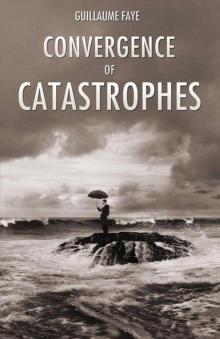Convergence of Catastrophes, page 20




Economism is Condemned
For the first time since the beginning of its history, humanity is using more resources and energy on the Earth’s surface than the Earth can provide. The Earth’s ‘capital’ is being whittled away, like a man living on his investments who, when the interest on his capital no longer gives him enough, begins to make a dent in his savings. Ruin is logically at the end of the procedure.
Planète Vivante 2002, the report of the WWF (World Wide Fund for Nature), is extremely alarmist: the Earth will soon no longer be able to produce enough for the growing needs and productive rhythms of a humanity expanding demographically and technologically. Humanity’s ‘bio-ecological imprint’ (the surface necessary to produce resources and absorb waste products) surpasses the capacities of the planet in a continually growing number of areas. In 2002, already 20 per cent more than the Earth can sustainably give us is being exploited.
Here are some examples. The Earth possesses 11.4 billion productive areas on land and sea, or 1.9 hectares per person. The ‘bio-ecological imprint’ (productive area under use) for each American is 9.6 hectares, 5 hectares for each European and 1.4 hectares for an inhabitant of the Third World. All these statistics keep on getting worse, however, all the way to the coming breaking point. For example, the bio-ecological imprint of France has grown by 47 per cent since 1960, while the population has only grown by 27 per cent. Feryel Gadhoum comments in Le Figaro Économie (5 December 2002): ‘The ecological imprint of the Hexagon increased in 1999 to 309.9 million hectares while its biological capacity was only 169.5 million hectares. In other words, if everyone lived like the French, we would need more than two planets and if we consumed like the Americans, we would need more than five planets.’
The official objective of Western (and world) civilisation is for all humanity to reach the level of consumption of rich countries, a situation ecologically and physically impossible. The WWF estimates that the situation is only going to get worse. Because of the planet’s demographic growth — which will continue until about 2060 — and its technological and economic ‘development’, the WWF report predicts that ‘humanity’s bio-ecological imprint is capable of reaching 180 per cent to 220 per cent of the Earth’s biological capacity by 2050.’
In other words, if demographic and economic development continues at this rhythm, the Earth, emptied of its resources and ecologically ravaged, will no longer be able to supply humanity. The famous ‘development’ will collapse upon itself. To avoid this catastrophe scenario, the experts and sages of the WWF propose three measures: 1) produce more economically and pollute less; 2) stop demographic growth; 3) world governments should agree to preserve the ecosystem and modify the current logic of the world economy that is sending us at full speed towards disaster from top to bottom, like a runaway horse or an airplane without a pilot.
* * *
Dreaming is useless. There will be no international agreement to stop the infernal machine and change the process of economic development. Egoism and pusillanimity will always prevail, as we saw at the Rio and Kyoto summits. The USA does not want to listen to talk about the environment (since they believe in the right to pollute and consume, as well as the infallible logic of the short-term goal) and the Third World is not ready to make sacrifices for the rest of the world.
So let us not delude ourselves. The solution of this unsolvable equation will be catastrophe, that is, the violent ‘adjustment variable’, which will automatically aim at humanity and not at Nature. Let us use an image. Man is asking too much from nature that cannot be supplied. But nature (the Earth’s ecosystem) is much more powerful and enduring than the fragile human species. So it is up to the human species to lower its pretentions or disappear. By overexploiting the Earth’s natural resources, humanity is not putting nature at risk, but nature’s provisional capacity to nourish humanity. Humanity is putting itself at risk. It is highly unlikely that in 2050 nine billion people can live in a civilisation of economic development and growth as we do today. No massive technological progress can be seen on the horizon that will lower the burden of the energy, farming and fishing levies on the capital of the Earth. The ecosystem in itself is in no way threatened. The Earth still has 4 billion years before it can regenerate all its resources — without mankind! — thanks to the chemistry of carbon, oxygen and hydrogen. A ravaged ecosystem will regenerate itself very rapidly, that is, in less than 100,000 years.
* * *
Let us talk again about the famous ‘adjustment variable’. The unsolvable equation we discussed earlier can be solved only by two spontaneous and automatic phenomena, which will escape every human will and every constructivist utopia: 1) a drastic reduction of the number of people on Earth; and 2) the end of the worldwide techno-consumerist civilisation based on a high degree of bio-energy usage.
The terrestrial ecosystem’s inability to meet humanity’s demands in the Twenty-first century will end in shortages and so will lead to crises, conflicts, famines, wars, epidemics, and so on. The human population could automatically be reduced by 50 per cent to 75 per cent in one or two decades. Today’s techno-industrial civilisation could collapse and no longer survive and perform except in very limited areas, while most humans would return to a way of life like that of the upper Neolithic Age. This scenario is more plausible than pursuing ‘development’ and ‘progress’ ad infinitum, the materialist version of the dreams of religions of salvation.
The Fraud of the ‘New Economy’
Everyone talks about the ‘new economy’, the economy of multimedia telecommunications and computer services based on the Internet, which is supposed to begin a second Golden Age. This magical concept is the occasion for smug optimists to repeat old progressivist and scientistic illusions. It is, however, a question of a fraud by neo-liberal circles, a scarecrow of more than one modernity in decline, for the ‘new economy’ could well end in disaster.
In reality, the Internet and the ‘new technologies’ introduced no ‘revolution’, but a simple evolution and perhaps an even bigger fragility. The real ‘new economy’ (based on the globalisation of exchanges, techno-science and instantaneous communications) is more than a century old.
‘Online’ sales on the Internet are only an improvement of the old mail order catalogues, which were introduced in . . . 1850; they do not represent a structural change. Similarly, the Internet, multimedia cell phones, cable television, smartcards and the general computerisation of society — even genetic engineering — do not represent structural changes. They are all only developments of what already existed. There is nothing in all this to compare with inventions that really turned the world upside down, the real techno-economic metamorphoses introduced between 1860 and 1960 that revolutionised society and the framework of life: internal combustion engines, electricity, the telephone, telegraph, radio (which was more revolutionary than television), trains, cars, airplanes, penicillin, antibiotics, and so forth. The ‘new economy’ is behind us! No fundamental innovation has taken place since 1960. Computers only allow us to accomplish differently, faster and more cheaply (but with much greater fragility) what was already being done. On the other hand, the automobile, antibiotics, telecommunications and air travel were authentic revolutions that made possible what before had been impossible.
This is one more reason not to succumb to the siren song of this ‘new economy’ that is supposed to ensure the end of economic crises, while it is in fact well on the way to produce the exact opposite.
Let us cite the judgment of the economist Frédérique Leroux, who criticises the ‘new economy’s’ fashionable economic optimism and mirages: ‘The dominant thought of market economists lacks breath and inspiration. Under the yoke of the prevailing conformism it has abandoned its iconoclastic dimension. . . . Linear projection has thus become the authoritative predictive tool. . . . Every moment we are getting closer to the zero degree of economic thought.’
While criticising the fascination of those who imagine that the Internet and start-ups are going to inaugurate a new era without recessions and without business cycles, she notes, ‘We are not sure if the expression “new economy” designates new technologies or a new mode of economic functioning (perpetual growth without inflation as opposed to alternating phases of growth and recession). In either case it suits everyone, since it allows them all to speak with expert enthusiasm of what they have, however, renounced understanding.’ The ‘new economy’ is only a phrase that refers to no concrete reality, neo-liberalism’s ideological ruse. Leroux writes, the ‘new economy’ is an expression that serves to allow us to pardon our renunciation of any effort of economic conceptualisation in favour of non-reflection. It is the marketing slogan of those who have opted for complacency out of intellectual frustration, ignorance, conformity, sloth or chance’ (Le Figaro, 24 July 2000).
Like Francis Fukuyama with his idea of ‘The End of History’ (after the fall of Communism with the concomitant belief in a planet unified by a universal liberal capitalism finally freed from political conflicts), the apostles of the ‘new economy’ want to make us believe that we have entered a miraculous period of perpetual growth, without crises and without recession.
Thanks to the Internet, start-ups, computer jobs, globalisation, and so forth, they imagine that the economy will avoid large-scale crises. These are religious — soteriological — visions of the economy, disguised by pseudo-scientific language. The ‘economic cycle’, however, always exists, for the root of the economy is human, purely psychological and not ‘technological’. Euphoria is always followed by panic and despair.
* * *
Many factors seem to proclaim that we are experiencing the end of a cycle of illusory growth and are on the edge of an economic catastrophe much worse than the crisis of 1929, because the world economy is more fragile, more globalised, and even more speculative than then. It is the logic of the house of cards or falling dominoes. We are not at all in a ‘new era without norms’, as the sorcerer’s apprentices of transnational neo-liberalism would have us believe. Already in the 1920s, a magnificent period of growth without inflation, it was thought that the new technologies (the automobile, radio, airplane, telephone, electricity, etc.) were going to definitely abolish crises and recessions. We saw what came of that . . . October 1929 and its aftermath is infamous precisely because that crisis was an important factor in the unleashing of the war. Today we are succumbing to the same belief in miracles with computers and the ‘new economy’.
The Dangerous Fragility of Globalised Liberal Capitalism
In the United States, we see the bankruptcies of Enron and WorldCom (with their fraudulent exaggeration of profits and assets), then United Airlines’ filing for bankruptcy (America’s second-largest airline company), unable to pay back $875 million in debt, as well as that of US Airways (America’s seventh largest airline). AOL Time Warner, number one worldwide in media and Internet services, is accused of having improperly swollen its income figures by $49 million to reassure the markets. IBM was obliged to fire 15,600 employees in the first half of 2004, or 5 per cent of its workers. In Europe, the unusual French company Vivendi Universal, the world’s second-largest telecommunications company, lost 12.3 billion euros from January to July 2003 and was forced to fire 30 per cent of its workers while its stocks lost 70 per cent of their value since December 2000. Crédit Suisse, the second-largest Swiss bank, has lost 396 million euros . . . The list is long, very long. The Christian Science Monitor (3 July 2002) estimates that 25 per cent of American firms deliberately misrepresent their profits in their annual reports in order to deceive their stockholders.
Ultra-liberal and free market economists explain to us that all this news does not portend a giant crisis of the globalised capitalist economy, but are simply the up and downs of the market; most firms with worldwide economic holdings are in good shape. Really? There are two worrying phenomena: 1) Some very large and successful businesses (British Airways, for instance) could change in a year from profits to colossal losses; 2) Highly localised events (like the 11 September 2001 attacks or a regional war that could break out anywhere tomorrow) are enough to shake the world economy and provoke disasters for ruined investors or fired workers.
This fragility of free-market ultra-liberalism — perfectly capable of provoking a worldwide economic collapse — is not a characteristic of the ‘market economy’ in itself, but of a purely speculative financial system based on short-term gambling on the stock market. The majority of large businesses are not ‘enterprises’, but in reality casinos, run on a day-to-day basis by overpaid administrators, who are media savvy and sit in ejection seats. The present speculative economy is no longer based on the logic of the ‘vocation’ (a product is made or a service performed), but on the aberrant American logic of the holding (participle of the verb ‘to hold’, to have in one’s hands). Groups like Vivendi Universal or Bouygues can unite activities with no necessary connection (for example, the distribution of water, television, multimedia, publishing, public works, etc.) into what amounts to a banking system. It is worth remarking that the most successful firms are those that stick to their métier[213] and are the least dependent on the stock exchange: Michelin (tires), L’Oréal (cosmetics), Arianespace (rockets), Teisseire (syrups), etc.
The objective of business is no longer productive industrial activity, but immediate profits for stockholders, whether small investors or big speculators. In these conditions foresight, wisdom in anticipating the future, and management, even in the middle term, are no longer possible. Everything can collapse at the slightest breeze, like a row of dominoes.
* * *
The world economy should be based on completely different foundations, certainly not on the utopias of the ‘anti-globalists’ of the Left. The market is a good thing, provided it is accompanied by the following correctives: 1) limitations on anonymous market capitalisation by big business; 2) the development of financing by saving at fixed rates to the detriment of stockholders; 3) the obligation of every business of significant size, including ‘private’ ones, to submit to government intervention; 4) limitation of the free market (merchandise, workforce, capital) in favour of creating self-centred, semi-autarchic and politically organised continental zones.
These are the principles of a ‘third way’ economy, which in addition also rejects paralysing business with heavy taxation and socialism. These principles have been defended by the two greatest French economists, François Perroux and Maurice Allais. This is the political economy of entrepreneurial capitalism, which is the complete opposite of the present speculative and globalist liberalism. People’s minds are not prepared today for this ‘third way’. Only a giant crisis and a collapse of the present system will permit such an evolution.
Some Small but Worrying Signals
The troubling economic predictions of Robert J. Samuelson[214] are little-known in France. This heterodox American economist is launching an important debate in the United States, which has been reported in the British, German, Spanish and Italian press. Not a word of all this, however, has appeared in the French press. French journalists, who understand no foreign languages, are concerned only with French (or Arabic or North African) gossip. Samuelson has developed this theory in an article in Newsweek,[215] where he wrote that the economic and political behaviour of the United States could end in a world crisis worse than the depression of the 1930s: ‘The global trading system is in trouble — mainly because it became overdependent on big U.S. trade deficits. From 1996 to 2002, the American trade deficit jumped from $191 billion to $485 billion. We Americans are buying vast amounts of foreign-made pots and pans, cars, CD and DVD players, bicycles, clocks, umbrellas, socks and shoes. In 1996, the United States imported $1.31 of goods for every $1 it exported; now, the import figure is approaching $2 (it’s $1.79 so far in 2003).’ For Samuelson this contradiction, between what claims to be an ‘imperial’ world superpower (strategically and militarily) and a speculative economy in deficit, can only end in catastrophe.
* * *
In the International Herald Tribune,[216] economist Thomas L. Friedman[217] emphasises the growing economic dependence of the United States on China and Japan: ‘As we and our government continue to spend and invest more than we save, we will become even more dependent on the outside world to finance the gap.’ Friedman explains that foreigners are taking greater control over US businesses and have become the creditor of the state. ‘And do you know on whom we’ll be most dependent for that? China and Japan. Yes, that China — the one the Bush team says is our biggest geopolitical rival.’ Not only do China and Japan finance the private sector, but a more serious matter, according to financial analyst Robert Hormats, is that ‘[n]ow, with these looming deficits, China and Japan are being asked to finance our government’s actual operations.’ These facts imply a growing economic dependence on China and Japan and therefore a strategic dependence on China, which, in the next two decades, could become the leading economic power in the world.
* * *
The worldwide infatuation with the Internet will perhaps turn out to be only a flash in the pan. The idolators of a technology always forget that it is inherently fragile. The Internet is already running up against two major problems: 1) the exponential proliferation of Web sites, which are surpassing the capacities of search engines and is ending by ‘drowning’ information; 2) the doubtful reliability of this information. But there is a third problem, the proliferation of viruses.



















